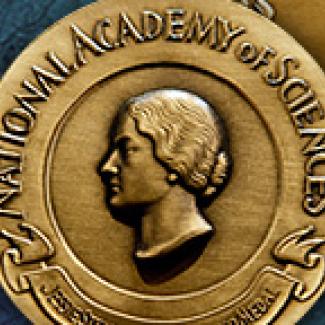
Zoghbi to receive the prestigious Jessie Stevenson Kovalenko Award
 The National Academy of Science (NAS) announced Dr. Huda Zoghbi, director of the Jan and Dan Duncan Neurological Research Institute at Texas Children’s Hospital, investigator, Howard Hughes Medical Institute, and professor, Baylor College of Medicine, will be the recipient of this year’s prestigious Jessie Stevenson Kovalenko Medal.
The National Academy of Science (NAS) announced Dr. Huda Zoghbi, director of the Jan and Dan Duncan Neurological Research Institute at Texas Children’s Hospital, investigator, Howard Hughes Medical Institute, and professor, Baylor College of Medicine, will be the recipient of this year’s prestigious Jessie Stevenson Kovalenko Medal.
Zoghbi will receive the award on Sunday, May 1, at the 153rd Annual Meeting of the National Academy of the Sciences. The NAS presents the Jessie Stevenson Kovalenko Medal every two years for outstanding research in the medical sciences. The Kovalenko Fund was gifted by Michael S. Kovalenko in 1949 in memory of his wife, Jessie Stevenson Kovalenko. For the last 63 years, the NAS has chosen distinguished scientists who have made landmark discoveries in medical research to receive this medal.
“Zoghbi unraveled the molecular basis of Spinocerebellar ataxia and Rett syndrome, providing novel insight into the pathogenesis of a broad range of neurologic disorders. Her contributions exemplify exactly the type of contributions to the medical sciences that the Jessie Stevenson Kovalenko Medal was designed to recognize,” said Susan R. Wessler, NAS Home Secretary. “Over the years, she has received numerous awards and prizes that honor her leadership in neuroscience research and exemplary mentorship to young neuroscientists and we couldn’t be more excited about this latest award. Her research initiatives have provided much-needed rays of hope for many patients and their families.”
Zoghbi, who is a professor of molecular and human genetics, pediatrics, neurology and neuroscience at Baylor, has made several seminal discoveries in diverse areas of neuroscience. Her work has significantly furthered our understanding of neurodevelopmental and neurodegenerative disorders and revealed novel strategies to reverse these conditions. In addition, her forays in basic developmental neurobiology have led to important insights in a broad range of conditions from hearing loss to colon cancer.
Among her many scientific accomplishments, Zoghbi is widely recognized for her pioneering work on Rett syndrome, a form of autism common among girls. In 1999, she and her colleagues discovered that Rett syndrome is caused by loss-of-function mutations in the X-linked gene MeCP2 (methyl-CpG-binding protein 2) which established it as the first autism spectrum disorder that is largely caused by sporadic gene mutations. She would go on to demonstrate that the brain is exquisitely sensitive to levels of what she terms the “goldilocks” protein, MeCP2, and that doubling MeCP2 levels causes another devastating neurological syndrome among boys.
Recently, her lab showed that using small antisense oligonucleotides to normalize MeCP2 levels in the brain reversed the debilitating symptoms of MeCP2 duplication syndrome in a mouse models of that disease
The NAS is a nonprofit society of distinguished scholars. Established by President Abraham Lincoln in 1863, NAS is charged with providing independent, objective advice to the nation on matters related to science and technology. Membership to NAS is a widely-accepted mark of excellence in science and is considered one of the highest honors a scientist can receive. The Jessie Stevenson Kovalenko Medal comes with a $25,000 prize plus an additional $50,000 for research.